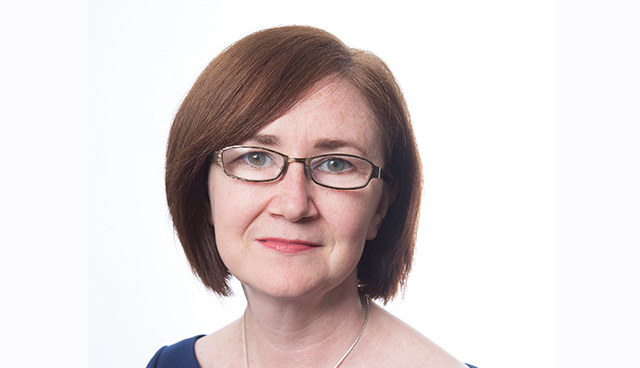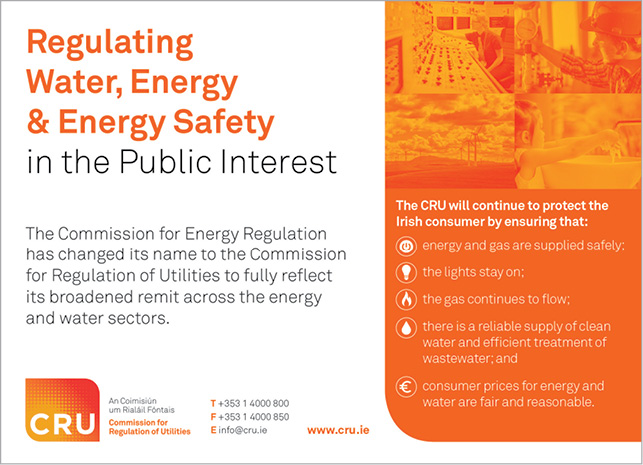Regulation: making a difference in climate change mitigation


Through incentivisation of network operators, market design and customer empowerment, the Commission for Regulation of Utilities can drive positive change in climate change mitigation. Aoife MacEvilly, Commissioner with the CRU, writes.
The CRU regulates water, energy and energy safety in the public interest. Our public interest mandate is broad and includes protecting lives through our safety remit, facilitating infrastructure investment, empowering customers and supporting Ireland’s transition to a low carbon future.
While regulators are expected to provide stability and certainty, our objective is to drive behavioural change to achieve policy outcomes. At a time when transformational change is needed to deliver on our national and global climate change commitments, the CRU is uniquely placed to make a positive difference by:
• incentivising monopoly network operators to do things differently;
• designing markets to deliver better outcomes; and
• empowering customers to make better choices.
Some of the CRU’s current initiatives in these areas are:
Networks
The CRU is redesigning our grid connection process to align with the new renewable support scheme and facilitate new technologies. We are using innovation funding and a new incentives and reporting regime to ensure that network companies invest and innovate to deliver decarbonisation solutions that work for customers.
As electricity networks see increased demand from electric transport and heating, we are working to ensure that this is managed (for example by shifting demand to off-peak times) to minimise investment costs for electricity customers.
The CRU is also supporting trial projects for biogas and compressed natural gas in transport, to ensure that our gas networks also contribute to decarbonisation, by displacing more carbon-intensive fuels such as oil.
Markets
The CRU, along with the Northern Ireland Utility Regulator, is transforming the all-island Single Electricity Market. The new I-SEM will be more competitive, enable more renewable generation and ensure that generators and other service providers deliver services that customers need. In I-SEM, market participants will receive less of their revenues for simply providing capacity and will compete to earn revenues for delivering system services. These system services will allow more renewable generation on the system, which in turn should lower wholesale electricity prices, particularly at times of high wind and solar availability.
Customers
While Irish energy customers are active by international comparisons, CRU research shows that they often lack the information or confidence to make the best choices. The CRU is therefore ensuring that customers receive ‘nudges’ such as reminders at the end of discount periods, or better information, such as the recent introduction of the Estimated Annual Bill which makes comparing energy offers easier.
As the energy sector is undergoing transformational change, the CRU is working to ensure that customers have the opportunity to benefit from, rather than simply paying for, this transition. This means empowering customers to benefit from lower prices at times of high renewable generation and to be more active participants in energy markets. This is why, working with policy-makers and industry, the CRU has decided to upgrade our energy meters through the National Smart Metering Programme.
Previous national trials demonstrated that with better information from smart meters, customers saved money by using less energy, or moving electricity use to off-peak times. These savings can benefit all customers who are willing to make a few simple changes in their energy use.
Over time, smart meters can deliver wider benefits by ensuring that electric vehicle owners are incentivised to charge off-peak, enabling people with solar PV to sell electricity to the grid, or facilitating more innovative services such as dynamic tariffs paired with smart home technology.
ESB Networks will start rolling out smart meters on a phased basis in 2019. Smart services will be switched on in late 2020 and following phases will see more meters installed (including smart gas meters) and increasing functionality. We know from international experience how important it is to help customers understand smart meters, what the benefits are and how we are ensuring a high standard of customer protection and rights. The CRU is therefore working with key stakeholders on a customer engagement strategy to ensure that customers are fully-informed and confident in adopting smart services.
Best Practice Regulation
As the CRU sets ambitious targets for others, we must also ensure that we are working to best international practice. That is why we invited the OECD to peer-review our performance. Overall, the OECD found CRU to be a high performing regulator and provided key recommendations to enhance performance, particularly in the areas of developing our leadership role, improved communications and accountability. We are currently implementing these recommendations, to support our delivery of transformational change in the transition to a low carbon future.

For more information:
Commission for
Regulation of Utilities
T: 01 400 0800
E: info@cru.ie
W: www.cru.ie






